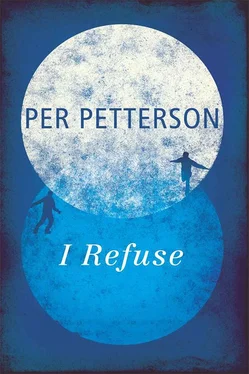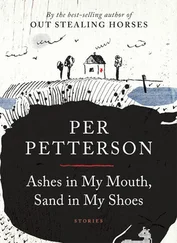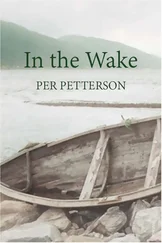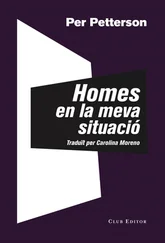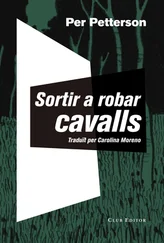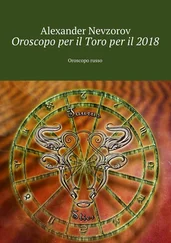‘What do young people do here, in Flateby.’
She laughed.
‘This is a real hot rod place, so it’s cars, cars, cars.’ She laughed again and shook her head.
‘But not you.’
‘No, not me.’
She didn’t look the type, either. On the other hand, it wasn’t genetic, being crazy about cars. You could look any way you liked. He knew that well enough from Mørk.
‘I just stand here to earn some money,’ she said, ‘and when I’ve got enough I’ll move into town. It’s expensive in town. I need something to start me off.’
‘That sounds very sensible.’
He took the newspaper, put it under his arm and stuffed the chocolate in his pocket, where it stuck out so far you could see the cows grazing in front of the mountains, and he lifted the big bottle of Coke from the counter and said:
‘Well, good luck to you with whatever you do in the future.’
‘That would be studying literature.’
‘Really,’ he said.
‘English literature,’ she said.
‘Well,’ he said, ‘that’s a challenge.’
She straightened her back, raised her index finger and said:
‘Do you think I am an automaton, a machine without feelings, do you think, because I am poor, obscure, plain and little, I am soulless and heartless.’
‘You think wrong,’ Jim said.
‘Exactly,’ she said.
‘That’s a bit of a tear-jerker,’ he said, ‘isn’t it,’ but he was surprised and a little shaken.
‘Disagree,’ she said.
‘I thought you would,’ Jim said, thinking he should add something, and if so, about literature, about England and Jane Eyre , certainly, he wasn’t completely ignorant, this was his area, or at least one of them, but he couldn’t think of anything to say.
‘Good luck in your life,’ he said.
‘Good luck in yours,’ she said.
He was crying on his way to the car. When was it he stopped holding back. Was it this morning, on the bridge, or was it long ago. She couldn’t see him cry from behind the counter, and anyway it didn’t matter. He would never enter the shop at this petrol station again.
And then he just drove. And ate chocolate. The whole bar. In the end it was gone, every single square of it, and only ten minutes later he had to go down a side road, get out of the car as fast as he could and throw up into a ditch. It took time, and it was quite painful. Eventually, he straightened up. He walked a few steps away from the vomit. He stood for a while. It was cool. The sun was low. Fields were all around, recently harvested. The stubble stood yellow and brush-like between the headlands. In the distance the road curved and sank between the steep fields towards Solbergfoss, where Lake Øyeren flowed into the Glomma river and towards the waterfall there, and the power station that looked like a fortress in a film he must have seen, a film about the war perhaps, in Norway, and then there would be white anoraks against the white snow and daring sabotage raids, and the big explosion and cascades of water and a courage rarely seen on the edge of the steep dam and then the fatal fall, and a face suddenly letting go, more in wonder than in fear sailing through the air in a silent arc, free of all travails at last, from all doubt, the dark body against the white foam, what comes now, the face is saying, what comes now, and the river sweeping on south between abandoned factory buildings all the way to the towns by the sea and out through the fjord and finally coming to a halt and dissolving in the salty, chafing North Sea many nautical miles off the coast of Scotland.
He walked up to the car and got in. In the glove compartment he found a roll of kitchen towel. Along its length there was a border of pixies and Christmas trees. He pulled off about ten Christmas trees and thoroughly wiped his face, his mouth and his eyes, and then he opened the big bottle of Coke and took a long swig. It tasted heavenly. He took another hefty swig and screwed the top back on tight and placed the bottle on the passenger seat and leaned back and instantly fell asleep, and when he awoke it was confusingly dark. He looked at his watch, he hadn’t slept for long, half an hour, perhaps a little more, but when the sun went down the light was fading fast. He had no idea where he was. There was nothing around the car that he had seen before. He thought: My name is Jim. I do know where I am. But he didn’t. It didn’t come back to him.
He turned the key and the engine started and the lights came on and lit up the trees in front of the car and some way down both sides, like inside a house, in a room, and made everything seem even more alien, and he thought, if I’ve driven in here, I can back out, and that was what he did, and after only a few metres in the red shine from the rear lights the yellow signposts came into view with the names of the places they were pointing to and the distances there, and it said nine kilometres to one and five to another, and the places were places he knew from the map. He made a U-turn as the trees swept past in the light from the headlamps, and he got on to the road, on the 120, and started to drive slowly back through all of Enebakk, through Flateby and a bit faster towards Lillestrøm and finally up the hills to the flat where he lived on top of the ridge.
On his way up the steps from the garages below the block he met the neighbour who lived opposite him on the ground floor. The neighbour stopped and smiled, his name was Sandem, and then Jim also had to stop. Sandem was a nice man, a good deal younger than Jim, at least ten years younger, or more, maybe twenty years younger, with a wife and two children in the kindergarten, they were all nice.
‘Are you going to watch the match tonight,’ he said.
Jim didn’t know which match, nothing came up when he searched his mind, was it an important match tonight, was it the cup, but Vålerenga had been knocked out before the quarter-final, it was a big disappointment, and so he wasn’t interested any more. He had gone from supporting Lillestrøm to supporting Vålerenga, and that wasn’t something he could talk about in public. But the semi-finals would be played on a Sunday, so that couldn’t be the match his neighbour meant, and Jim didn’t dare ask.
‘No, I have to turn in early.’
‘Well, it’s on a bit late,’ Sandem said.
‘Yes, it is,’ Jim said.
‘Or else we could have watched it at my place. I’m on late shift tomorrow. There is plenty of beer in the fridge.’ He smiled.
Late shift, Jim thought. He was absolutely positive the neighbour knew he was off sick or at least had been. At some point he must have told him, but it wasn’t an issue here. Sandem was considerate.
‘We’ll catch the next game,’ Jim said. ‘Perhaps the Cup final.’ And he could safely say that.
‘That would be nice,’ Sandem said. ‘My wife’s not at all interested. She leaves the room the minute there’s a pair of shorts on the screen, and the kids are still too small. It’s boring always sitting there alone,’ and then he said:
‘You’re going out fishing, then, are you.’ He smiled again. How can he know that I go fishing at night, Jim thought. I haven’t told him. But then he remembered they had bumped into each other a couple of times early in the morning when Jim was on his way back from the bridge, and Sandem was on his way home after night shift. Then they’d barely said hello. Sandem was tired, and Jim was tired, and that was that, and he thought, my old reefer jacket must have smelt of fish, or the smell must have come from the bag, yes, definitely, the bag, that was where he kept the fish, if he had caught any, until he gave them away.
‘Yes,’ he said, ‘that’s my plan,’ but it wasn’t his plan. He didn’t know why he said that. It was stupid of him. It’s stupid when you say things aloud, he thought, they commit you, you can’t get them out of your head.
Читать дальше
